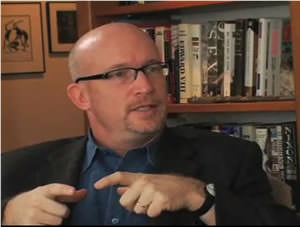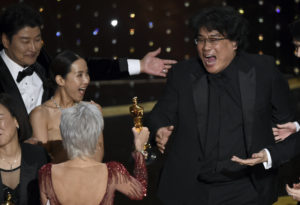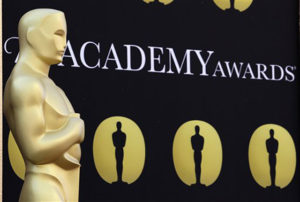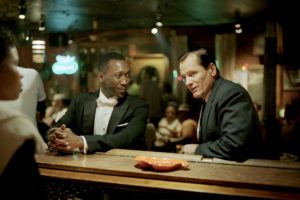Alex Gibney in Conversation With Robert Scheer
Truthdig Editor Robert Scheer interviews documentarian Alex Gibney about his 2008 Academy Award-winning documentary, "Taxi to the Dark Side," a compelling examination of the circumstances that led Americans to commit torture.
Truthdig Editor Robert Scheer interviews documentarian Alex Gibney about his 2008 Academy Award-winning documentary, “Taxi to the Dark Side,” a compelling examination of the circumstances that led Americans to commit torture.
Also, be sure to check out LinkTV’s special “The Politics of War,” which includes extended interviews with Alex Gibney and “No End in Sight” director Charles Ferguson, along with clips from their films.
Watch the interview:
Watch the trailer for “Taxi to the Dark Side”:
Transcript:
Robert Scheer:
Hi, it’s Robert Scheer, Editor of Truthdig. I’ve interviewed a lot of people, but I’m really excited to talk to Alex Gibney here, because I have enormous admiration for your work, and I’m not just blowing smoke here. I thought your film “Enron: The Smartest Guys in the Room,” which was nominated for an Academy Award, was just about the best way to teach about the American economy. I use it in classes. It’s a great film. You worked as the producer, the executive producer, on “No End in Sight,” which is also this Sunday up for an Academy Award for documentary, competing against the film that you directed, “Taxi to the Dark Side,” which I think is the most compelling movie, certainly in the last 10 years, maybe one of the most compelling movies ever made, about the subject of torture. And I want to tell people you can see it up the road, maybe you can rent it, see it in some theaters.
Alex Gibney: It’s in some theaters now.
Scheer: It can win the Academy Award.
Gibney: And then it will come back again, and soon, this fall, it will be on HBO.
Scheer: And it will be on Link TV for those who get Link where they are. What I felt compelling about this movie — first I wasn’t going to see it. I only saw it because we were going to do a discussion after I watched and thought it was going to bum me out.
Gibney: See the problem.
Scheer: I know the problem. We all avoid seeing it, and I didn’t have any trouble watching it, because, I don’t want to use the word educational. … I kept learning, I kept learning about human beings. And what’s compelling about this movie is you get inside the heads of people who did the torturing.
Gibney: That’s right.
Scheer: And some of them fall apart. Why don’t you talk about that?
Gibney: Well, generally speaking, I’m more interested in perps than the victims. It was that way with Enron, too. I was interested in these traders who broke down the California grid. I was interested in actually what made Ken Lay and Jeff Skilling tick. And in the case of “Taxi to the Dark Side,” I was interested in these guys who brutally tortured and murdered this young Afghan taxicab driver. And some of them were interrogators, some of them were military police. They had felt scapegoated because the people who either condoned or ordered [them] to do what they did weren’t even investigated, much less convicted of anything. So I think that gave them a motivation — .
Scheer: Right up to the president of — .
Gibney: Right up to the president of the United States. So in talking about — .
Scheer: So for people who haven’t seen the film, we should stress that. Some of these guys are kids.
Gibney: They’re all kids. And they had exactly one day of guard training, these guards. And the interrogators sometimes had three-four hours of interrogation training before they performed their first interrogation. That gives you some sense of the kind of science of interrogation and detention that we were dealing with. There were kids thrown into a situation at a time when the Bush administration were saying the gloves were off, there are no rules anymore, forget the rules, throw out the rules. Just get the information however you can. And so these kids went into that situation and were being pushed harder and harder by their superior officers. One sergeant told one of these kids, “Take that prisoner out of his comfort zone … ,” meaning, beat him up. And in retrospect, they’re deeply haunted by what they have seen and what they did. As one very big, burly guard said, “I wish I had done stuff according to my own morality instead of what was common.”
Scheer: But these are kids who’ve never been out of the country before? Some may have found themselves — .
Gibney: A lot of them were National Guard and suddenly they’re in a foreign country, where bullets are flying and your buddies are dying. …
Scheer: Now this taxi driver, he was totally innocent?
Gibney: That’s one of the things of this story that have always haunted me. There are two things that will always haunt me. One is, this kid, he’s a 122-pound kid, he was 22 years old, I believe. He was driving home in his taxi and was picked up by Afghan militia, turned over to American forces. [The Americans were told] that he was responsible for a rocket attack. It turned out that the people who turned him over were the ones who launched the rocket attack. The Americans didn’t know it. They tortured him so badly that, they beat him so badly that ultimately he died of his injuries after five days. On the third day, though, they discovered he was innocent and, for another two days, they tormented him until he died. They literally kicked his legs so often that they became pulpified.
Scheer: Even though they knew he was innocent?
Gibney: Even though they know he was innocent. And that was one of the things — .
Scheer: It was that the inner barbarian had been released?
Gibney: I think so. There is kind of a momentum to torture, as later on I discovered in the process of making this film. They have a term, it’s called “forced drift,” and so when you’re interrogating somebody, you’re trying to get information out of somebody and they don’t give you it, then you ramp it up. Particularly if there are no rules to guide you. And then you go more and more. And the next thing you know, you’re starting to brutalize somebody because they’re no longer a human being. And the military does understand this, and that’s why the military had rules in place, because you want a disciplined unit. You don’t want a mob, a lynch mob, in effect. But the Bush administration removed those guidelines. …
Scheer: And in your movie, you interviewed people who were higher up, but not the highest?
Gibney: We go up the chain of command.
Scheer: You go to Colin Powell’s chief of staff.
Gibney: We go to Colin Powell’s chief of staff. And also Alberto Mora, who was a former general counselor for the Navy. We also talked to the commanding officer of Guantanamo. And the man inside the Bush administration who was responsible for manipulation of all the laws, or at least manipulating the interpretations of all the laws. So that we could imagine a policy of torture and so the people at the top of the administration could elude prosecution for war crimes. Scheer: You know what I was thinking is, why your film is not being discussed in the presidential debate. If you think about it, the whole image of the United States has been tarnished, maybe like it’s never been before, by this torture. … And here we have a campaign going on, a presidential campaign, and here it sounds like only a marginal issue.
Gibney: I don’t understand it either. At its fundamental … there are two things that are fundamental about this film. One is, it’s about how you fight the war on terror, and how badly it’s being fought now. It’s also, it’s about corruption of the rule of law, which is so essential to who we are and who we want to be, I think. …
Scheer: Which, by the way, is what the war on terror is supposed to be all about …
Gibney: That’s right.
Scheer: … to educate the people of the world about limits, about the rule of law, about discipline.
Gibney: That’s right.
Scheer: But on your first point, about how we fight the war on terror, what your movie shows is really how we get bad information?
Gibney: That’s right.
Scheer: This is really an exercise about not being alert to the truth about how you are attacking, why you are attacking. It’s getting information that will support your president’s exploitation of 9/11.
Gibney: Ultimately, torture can be a political tool. That’s where it’s been most dangerous. When you start to get the information you want to hear because you’re coercing people, then it’s undergirding your policies … not only that it’s covering up your mistakes. You think you got the wrong guy? You know you got the wrong guy? Oh, my God! Torture him until he’ll confess. Then he’s no longer the wrong guy. Now he’s the right guy. He’s one of the worst of the worst.
Scheer: Let me ask you a question. You’re a producer for one film that’s up for an Academy Award this Sunday night, and you’re a director for another. You’re up against Michael Moore. There’s some competition here. You have to give Michael Moore credit for opening up the documentary field, don’t you?
Gibney: I give Michael Moore credit. I had dinner with him last night. I give him tremendous credit for opening up the field. He created the sense that documentaries can be commercial. My film about Enron was a big commercial success. And my documentary on Enron gave me freedom; it allowed me to say it the way I wanted to say it because it was entertaining enough that it could be commercially viable. It’s been great. And Michael’s done other terrific stuff. He has a film festival, the Traverse City [Mich.] Film Festival. A couple of my films have been shown there. Interesting crowds; not all Democrats — Republicans. … There’s a sense of possibility that these documentaries, as they get to be more and more entertaining but also more informative, give people stuff that they normally don’t get in the TV media, at the very least. People are starting to get interested. So Michael, I think, has done a tremendously good job of being a kind of blocking back for the rest of us who follow through the lines.
Scheer: So even though you guys are going for the big prize here — I mean, it’s very important to be nominated for an Academy Award. It will help your film, help your career in the best way, you’d be able to make other good movies. But winning the Academy Award is a pretty big deal. You already were nominated for an Academy Award?
Gibney: I lost to the penguins [“March of the Penguins”] last time. It would be nice to win this time.
Scheer: But you guys — .
Gibney: But at the same time, Michael did a nice thing last night. He took all of us out to dinner. All five of the nominees sat down and broke bread. It was great. And so there’s a pretty collegial spirit. But because Michael’s a celebrity, they’re seating him separately from the rest of us [at the awards show]. That didn’t go down too well with us. But I think everything else about it feels pretty collegial. We’ll see who wins, but at this point being nominated is to be in a pretty good group.
Scheer: And since the voting has already taken place, what did you think about the other documentaries?
Gibney: I liked them. … I liked them all. They were different, and it was intriguing for me. I voted because I’m a member of the academy. And I can tell you I voted for myself. But the other ones were good.
Scheer: By the way, I don’t mind being on record saying that from the ones I’ve seen, yours is the most important. Not just because of the subject being the most important, but you deal with it, as you said before, in a way that makes it accessible. If it was a dreary project, crying-type movie, which it could be — .
Gibney: It’s kind of like a detective story: You follow the murder.
Scheer: You humanize the torturers as well as the tortured. That’s what I felt was absolutely compelling about this documentary, and I’m encouraging people if they haven’t seen it to try to get to see it. I remember in the old days, when I used to go to Academy Award things, I remember seeing “Panama” and it took me two months to get a copy of it.
Gibney: “Panama Deception”?
Scheer: Yeah. To actually see it. At that time, you made a documentary and nobody saw it. At this time, people are seeing them.
Gibney: People are seeing them.
Scheer: Your film got a bigger distribution because you won a film festival, right?
Gibney: Right. I won the Tribeca Film Festival [in 2007]. Out of Tribeca, a distributor picked it up. It’s available in theaters. Hopefully, if it wins an Oscar, more theaters will open it up. HBO will show it.
Scheer: What about the formula Robert Greenwald used, where he had MoveOn distribute the film, the DVD?
Gibney: MoveOn, he had them do these things, I can’t remember what they’re called, these little groups.
Scheer: Well, how about sending it out through Truthdig? Win or lose, we’ll make an offer.
Gibney: Maybe … maybe … maybe that’s what we should do … OK. People see it right now: the beginning of a conspiracy.
Scheer: All right, Alex. Thanks for bringing us to the cesspool and having us look deep down into it.
Gibney: Looking right down to the bottom. My specialty: films that will make you sick. [Laughter]
Your support matters…Independent journalism is under threat and overshadowed by heavily funded mainstream media.
You can help level the playing field. Become a member.
Your tax-deductible contribution keeps us digging beneath the headlines to give you thought-provoking, investigative reporting and analysis that unearths what's really happening- without compromise.
Give today to support our courageous, independent journalists.






You need to be a supporter to comment.
There are currently no responses to this article.
Be the first to respond.